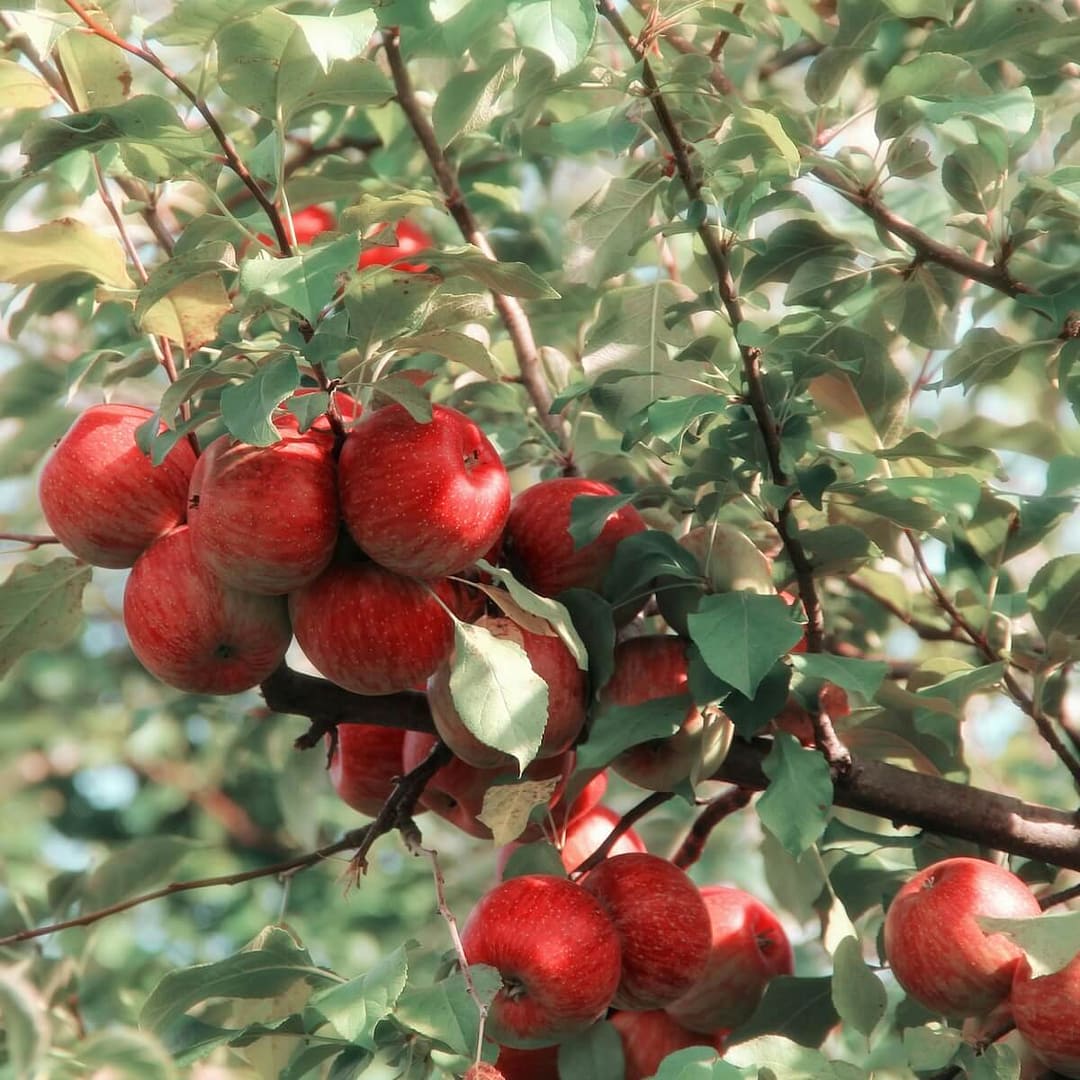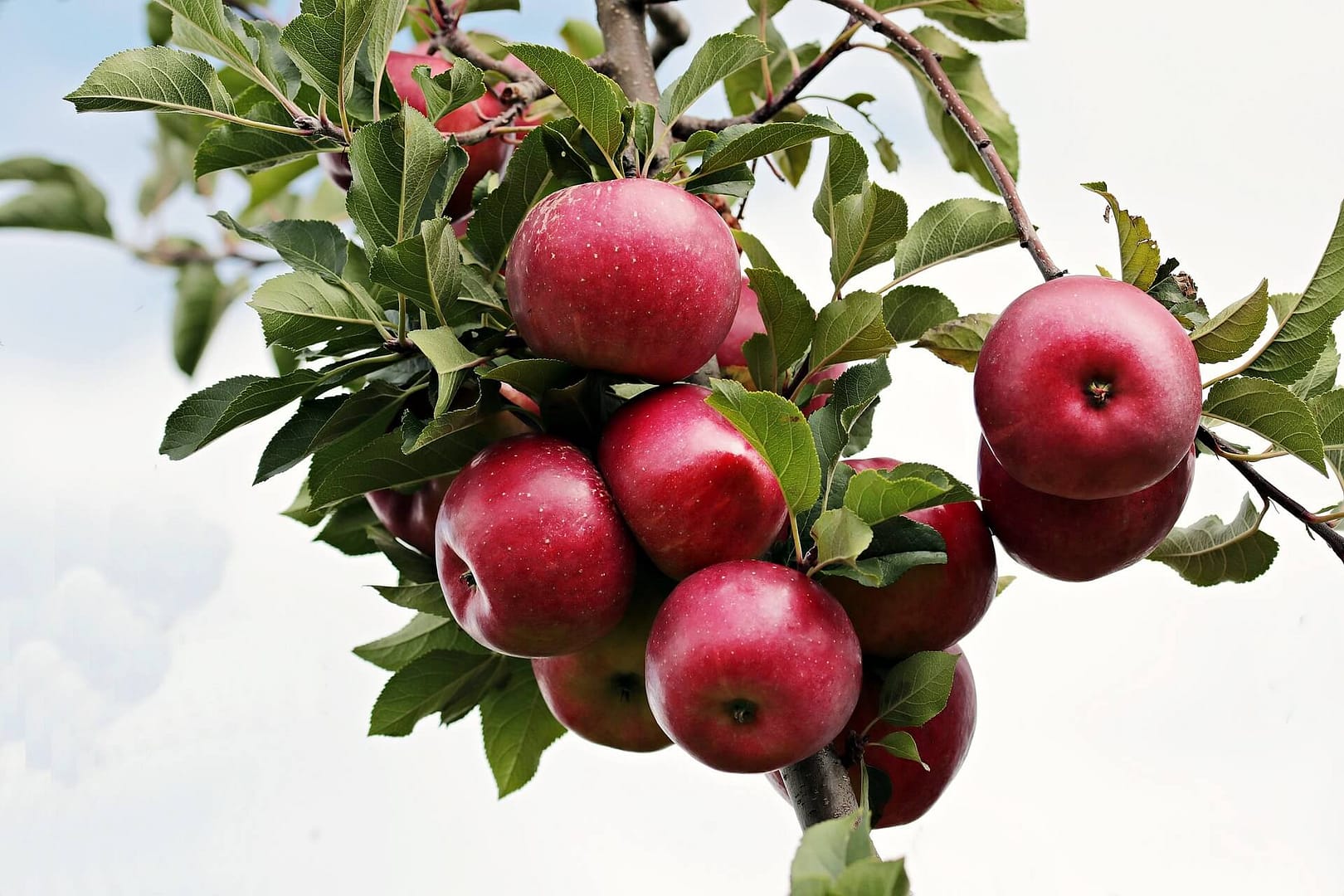
Position
- Requires a sunny, sheltered position for optimal growth
- Should be protected from strong winds as this can damage flowers and hinder fruit production
- Avoid frost pockets; planting in a slightly elevated position or near a south-facing wall can help
-
Hardiness
- Hardy in temperatures as low as -15°C (5°F)
- Can comfortably withstand the UK’s typical winters when planted in appropriate conditions
Soil
- Grows best in moist, well-drained soils
- Prefers fertile soil, such as loam, but can tolerate sandy or clay soils if well-amended with organic matter
- Thrives in neutral soil but can tolerate slightly acidic or mildly alkaline conditions (pH between 6.0 and 7.0)
- Grab a soil test kit and ensure the perfect conditions for growth
Height
- Reaches an approximate height of 3–4 metres (10–13 feet), depending on the rootstock it is grafted onto and growing conditions
- Proper pruning and maintenance can influence the size
Seasons of Interest
- Flowering: Displays elegant pinkish-white blossoms in April during spring, attracting pollinators
- Foliage Colour: Deciduous with plain green leaves turning golden-yellow in autumn, adding ornamental charm
Additional Notes
- Fruit typically ripens and is ready for harvesting in late September to early October
- Prune in winter to shape and control size; summer pruning after fruit set improves light penetration
- Provide regular watering during dry spells, especially in the first 1-2 years of establishment
Why Apple Queen Cox Is the Best Self-Fertile Apple Tree for UK Gardens
The Queen Cox apple tree is a superior offspring of the famous Cox’s Orange Pippin, known for its aromatic flavour and firm, juicy flesh. Unlike many other apple varieties, it is self-fertile, meaning it doesn’t require a second tree for pollination. This makes it an excellent choice for smaller gardens or those looking for a low-maintenance fruit tree.
Choosing the Right Location for Your Apple Tree
Plant apple trees in a sheltered, sunny position with well-drained soil for the best results. A spot that receives at least six hours of sunlight daily will ensure all its plants thrive. Before planting, enrich the soil with well-rotted organic matter to provide essential nutrients.
How to Plant Your Queen Cox Apple Tree
- Dig a planting hole twice the width of the root system and slightly deeper than the roots.
- Place the tree in the hole, ensuring the graft union is above the soil level.
- Backfill with a mix of soil and compost, firming it down gently.
- Fasten the tree with a stake and tree tie to provide support.
- Water well and mulch around the base to retain moisture.
Pollination and Companion Trees
While Apple Queen Cox is self-fertile, planting it alongside other apple varieties from Pollination Group 3 can enhance fruit production. Consider adding a Cox’s Orange Pippin or another compatible fruit tree to your orchard if space allows. Please check out my article here for more information on Apple pollinating groups.

Caring for Your Queen Cox Apple Tree
- Watering: Water well during dry spells, especially in the first few years.
- Feeding: Apply compost or well-rotted manure in early spring.
- Pruning: Prune annually to maintain shape, remove dead wood, and encourage fruiting.
When to Harvest and Enjoy Your Fruit
Queen Cox apples are ready for harvest in mid-to-late autumn. Their crisp texture and firm, juicy flesh make them brilliant eating apples. Store them in a cool, dry place to keep them in perfect condition for months.
Where to Buy a Queen Cox Apple Tree
You can buy apple trees from reputable nurseries, garden centres or online from specialist growers. When purchasing, look for bare-root or container-grown trees in perfect planting conditions.
From Darren’s Patch
I’ve always had a soft spot for Queen Cox — it’s a true gem in my orchard. What sets it apart is the balance of sweet, aromatic flavour and that crisp bite that makes every apple a treat straight from the tree. Being self-fertile is a real bonus too, especially for those with limited space. I grow mine in a sunny, sheltered spot with well-drained soil, and it’s never let me down. A little mulch in spring, a tidy prune in winter, and it rewards me year after year. The fruit also stores beautifully, so I enjoy homegrown apples well into the colder months. If you’re only planting one apple tree, Queen Cox is hard to beat — reliable, compact, and bursting with character. It’s one of those varieties that truly earns its keep in the garden.
![]()
Key Points to Remember:
- The Queen Cox apple tree (Malus domestica) is a self-fertile dessert apple with an aromatic flavour
- Plant in a sheltered, sunny position with well-drained soil
- Before planting, enrich the soil with organic matter for a healthy root system
- Regular watering, feeding, and pruning will ensure a high yield
- Harvest in autumn for delicious, juicy flesh with a hint of acidity
- Buy online or from trusted nurseries for the best quality trees
Grow your own Queen Cox apple tree and enjoy the rewarding experience of harvesting your delicious fruit!
To see the RHS article, please click here
Want to learn about other apple varieties? Read about Apple Lord Lambourne here
For more information on Fruit for your garden, please click here
Frequently Asked Questions
Q: What makes Queen Cox Apple Trees unique?
A: Apple Queen Cox is known for their outstanding flavour and belongs to the Pippin family. They produce delicious dessert apples that are perfect for eating fresh or using in recipes. Plus, they’re self-fertile, meaning you don’t need another tree for pollination.
Q: How tall do Queen Cox Apple Trees grow?
A: When fully mature, these trees can reach up to around 4m in height. Queen Cox is an excellent choice for planting a fruit tree that won’t overwhelm your garden.
Q: Do I need to worry about pollination with Queen Cox Apple Trees?
A: Not really! As a self-fertile variety, Queen Cox can pollinate itself. However, having another apple tree nearby can enhance your harvest by increasing fruit production.
Q: What kind of soil do Queen Cox Apple Trees prefer?
A: They thrive in well-drained soil. Please ensure the soil is enriched with well-rotted organic matter and not too heavy, as poor drainage can cause root issues. A suitable rootstock, like MM106, is often recommended for optimal growth.
Q: Where can I buy Queen Cox Apple Trees?
A: Queen Cox Apple Trees are available at garden centres and online retailers. Search for “Queen Cox Apple Trees” to find reputable nurseries that sell them.
Q: Are Queen Cox Apple Trees suitable for beginners?
A: Absolutely! They’re relatively easy to grow, especially since they’re self-fertile. They’ll thrive with minimal effort if they receive enough sunlight and are planted in well-drained soil.
Q: How do Queen Cox apples taste compared to other varieties?
A: Queen Cox apples have a unique flavour, often sweet and tangy with a hint of spice. They’re closely related to the famous Cox’s Orange Pippin and are considered one of the best dessert apples.
Q: What is the RHS, and how does it relate to Queen Cox Apple Trees?
A: The RHS, or Royal Horticultural Society, provides expert gardening advice and plant care tips. They offer guidance on growing fruit trees like Queen Cox, helping you achieve the best results in your garden.
Q: Can I grow Queen Cox Apple Trees in containers?
A: Yes, you can! They require a large container with good drainage to ensure healthy root development, making them an excellent option for smaller gardens or patios.
